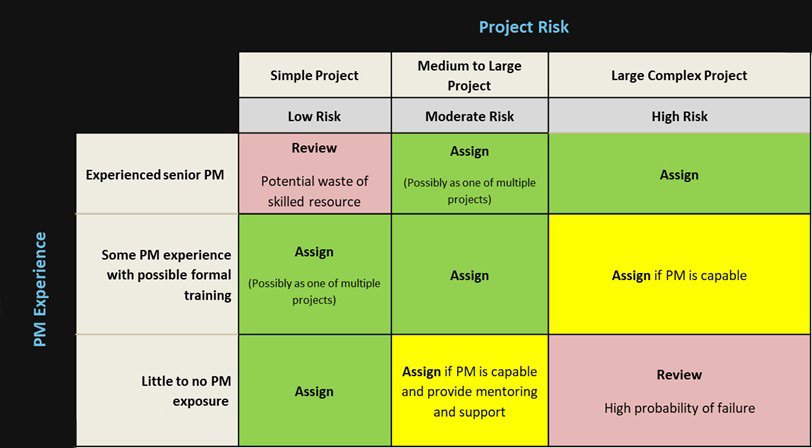A regular challenge in any active PMO is integrating new project managers into your way of doing things. This is challenging when you are called upon to improve project management capability because you have had to take on one or more inexperienced project managers. There are many reasons why this may be the case. Firstly, the PMO may be taking on younger, less experienced people because generational change is seeing your baby boomer PMs head into retirement. Secondly, you might be in a low maturity organisation that believes that sending an employee on an introductory project management course enables the employee to manage any project. Lastly, and perhaps even worse, a decision-maker in your organisation has decided that their people are best at delivering a project, because they know their business area so much better than any external project manager.
The risk with any of these scenarios is that one of these newly-minted project managers is handed an initiative that becomes a large complex project with significant internal risks to manage. Consequently, you may face risks that your executives have not recognised if they arise because of a poor scope or schedule management. This can be a frustrating time as you try to integrate new PMs into a functioning PMO while departments jostle for control. You face bewilderment from people forced to deliver using new methods, and resistance from others who think project documentation is too much trouble. After that, the big project begins to show signs of trouble, and you as the PMO manager are asked to step in and smooth out delivery.
Read on to discover how you can avoid these challenges and take project managers on a path that transforms them from beginners into a capable delivery team.
Educate Upwards
Company executives assume the ultimate responsibility of for the execution of strategy. Above all, if they are project sponsors, they need to understand how project governance works and commit to being part of a workable governance structure. If you are working in an immature organisation, it will be useful to engage early with these executives by setting up a short information session to summarize the approach to improved project management capability. Keep these sessions short, executives are busy people who can spare you only an hour or two at most. This is your opportunity to sell the concept of project management to the decision makers, to engage them with the idea that projects provide a structured approach to executing strategy.
If you are in an organisation with a more mature environment, you may already have a governance structure. As a result, the conversation becomes more about inducting new executives into this structure.
These conversations are important because they enable you to position the governance structure to restrict inter-department conflict, or to establish central control of a resource pool.
You, as the PMO manager, need these introductory sessions because they sanction the additional rigor you are trying to impose with executive authority. They also encourage a culture of executive ownership. As a further outcome, these meetings also identify you, to these senior managers, as the resident source of project knowledge.
Set Standards
A project may be given to a particular individual because of their inherent business knowledge or because their manager trusts them to get a job done. However, this doesn’t mean that they can’t become great project managers. This person is a subject matter expert and is often passionate about their area of expertise. They are capable of self-managed activity and may be tasked with managing others. If you are lucky, they are also good at influencing others.
Approach improving project management capability with these individuals by providing a short in-house training course on the PMO’s expectations. This focuses on the absolute basics of scope, planning, and delivery, and sticks to the simplest tools. Above all, consider at the very least, a schedule, budget, risk analysis, and a scope statement that focusses on outcomes. Keep everything simple by developing cut down tools that describe your process in an unambiguous way. Secondly, ask yourself what is the minimum information you need to manage the portfolio? Develop tools that meet this need and don’t go far beyond that in the beginning. Lastly, conduct regular health checks on how these new project managers are delivering. This is never done as a fault-finding exercise, but rather in a spirit of encouragement and guidance. Remember that you were also once a beginner and needed the advice of more experienced mentors.
Don’t forget to introduce the requirement for regular reporting, which allows you to set expectations of regular contact with the PMO. After that, you may consider implementing simple agile tools such as daily stand-up meetings and Kanban style visual management boards. Overall, choose tools that are easy to teach and provide the beginner project manager with ready feedback on their progress.
Finally, encourage basic project hygiene across your entire pool of projects. Do project managers report on time? Are the reports detailed and accurate? Is spelling and grammar acceptable? While this may sound trivial, it develops a focus on quality that may be reflected in more serious metrics like schedule and cost variance.
Improve Project Management Capability over Time
 People do not stay beginners for ever. Consequently, it is prudent to plan for those people who take a wider interest in project management and come asking for more information. Such people are the ones who may become those skilled project managers who are a real asset to the PMO. This is the time when you may need to act as a mentor and provide suggestions around formal training or career progression.
People do not stay beginners for ever. Consequently, it is prudent to plan for those people who take a wider interest in project management and come asking for more information. Such people are the ones who may become those skilled project managers who are a real asset to the PMO. This is the time when you may need to act as a mentor and provide suggestions around formal training or career progression.
As your beginner project managers mature, consider introducing a risk metric to measure each project in the portfolio. This is a risk of project failure base on the size, complexity, potential for adverse consequences, or other inherent risk. If we map the risk metric against the experience of potential project managers as in the table below, there is an argument for choosing more experienced project managers for risky projects.
The choice of how you classify a senior project manager in this diagram depends on the scope and nature of your program of work. The selection process can range from a subjective choice, based on your experience of the people involved to a detailed skills evaluation tool.
If your resource pool includes experienced project managers, consider asking some of them to mentor the new project managers. Such mentoring can be as informal as a regular coffee meeting where the experienced project manager answers questions and offers advice on any of the multitude of challenges that the beginner project manager faces.
Own their Outcomes
Your new project managers have been thrust into an unfamiliar world. As such you can make them part of your internal team culture by treating them as part of your core team from day one. Be alongside them as they learn from their mistakes, and just as important, be there to acknowledge and celebrate their success.
If you have obtained executive support, have encouraged delivery to be the best it can be, and backed it up with the tools and processes to get the job done, then give yourself a high five. Now, your new project managers have the best chance of making a great entry into the exciting world of project management. After all, one of the great joys of running a PMO is seeing the moment when a first-time project manager takes an ambiguous strategic initiative and turns it into concrete outcomes that their team has taken great pride in delivering.




